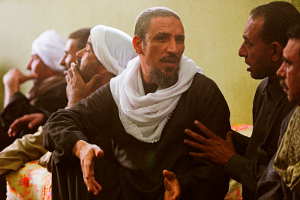Egypt: New Life for old Tradition
by Patrick Hemminger
Photos: Frieder Blickle
 Tarek Ramadan practices law in Egypt. His current specialty is breathing life into old traditions: He recruits and trains “Muhakimin,” arbitrators who manage conflicts between neighboring families. That was the traditional role of the judge in Islam.
Tarek Ramadan practices law in Egypt. His current specialty is breathing life into old traditions: He recruits and trains “Muhakimin,” arbitrators who manage conflicts between neighboring families. That was the traditional role of the judge in Islam.
Today Muhakimin offer an alternative to the Egyptian judicial system, where trials take years and corruption is widespread.
One of the country’s best-known Muhakimin is Abu Zaid, a man trusted to work out acceptable compensation packages even in serious cases such as rape or murder. His nickname is “Sheikh al-Muhakimin.” He is often addressed by “Hajj”, as a sign of respect.
He has made the Hajj, the annual pilgrimage to Mecca, five times. He is known for his wisdom, but the case he is working on today is complex and he has had little time to prepare.
Male members of two families – those of an accused criminal and his victim – have gathered in the front room of a house in al-Mansuriya, a village in the Nile delta. The house belongs to one of the village’s wealthier men, who has lent them his living room as a venue.
The men are waiting for Abu Zaid. They have high expectations. He is known for finding the right words, for reframing conflicts so that sworn enemies can be neighbours once again. For now, the opposing families sit on carpets, leaning back against the wall. The silence is oppressive.
When a man here speaks, then only to the man sitting next to him, and they lower their voices. They all know each other, at least by sight. The air is thick with mutual dislike. There was an argument that became a fight. Someone reached for his knife, beginning a process that they hope will end here. No one wants an endless feud. But to end it, they need help.
Abu Zaid enters the room and offers a greeting. He knows what these men expect from him. He seems up to the task. An imposing man, with broad shoulders and a booming voice that catches everyone’s attention where ever he goes. Whether he can prevent further bloodshed will depend on his choice of words, his sensitivity to the dignity of both sides.
Abu Zaid asks the circle: “Are the two parties in agreement that they seek reconciliation here today? And that they will thereafter regard the case as closed?”
“No!” the victim calls out, raising his arm. He is trembling with anger. “When this guy came at me with a knife –”
“Enough!” Abu Zaid’s voice thunders through the room. Immediately, there is silence. “The facts of the case were already discussed at previous meetings. Your accusation just stirs things up. The father of the accused has admitted his guilt. You can feel certain that we will find a solution.”
One man in the room is careful to stay in the background, observing. Tarek Ramadan stands out among the traditionally dressed villagers in his jeans and pale blazer. His attitude is calm and relaxed, but he pays close attention to the faces of the men. Nothing escapes him.
Ramadan knows how to make himself nearly invisible. He is not a Muhakim, but this man of only thirty-seven may play an important role in the survival of the tradition in Egypt.
Muhakimin like Abu Zaid have been part of the Arab world for generations. In earlier times, they were simply the oldest members of a family, who were assumed to have better judgement on questions to do with religion and law. If their opinions proved to be wise and helpful, their reputations might spread.
The tradition of the Muhakimin has become less significant during recent years. In modern Egypt, tribal elders compete with televised preachers and online counseling. People today are more mobile, likely to leave their home villages where the Muhakim still play a role.
But Tarek Ramadan still sees a bright future for Muhakimin. He explains that they can step in where the courts fail.
For years now, he has worked as a lawyer for CEWLA, an organization providing legal support to Egyptian women. That experience has familiarized him with the many weak points of the Egyptian justice system. Egyptian courts work slowly, and in many cases they work badly.
Many judges and attorneys are corrupt. There is general public mistrust. No one, Tarek Ramadan says, can depend on the rule of law. Ever more people take the law into the own hands.
Many conflicts can be traced to everyday annoyances. A dripping laundry line, a blocked parking space. But in small Egyptian towns, no conflict is ever just between two people. What begins as a heated discussion soon becomes a battle between two families. When neighbours dispute a property line, their brothers, sisters, cousins, children, parents and grandparents take sides.
The repeated theme: wounded honor. If no one steps in to help calm things down, the conflict can result in a blood feud with multiple deaths.
In small towns, victims and perpetrators can’t avoid each other, so that old wounds are constantly being reopened. In a normal court, the idea is to punish the perpetrator. The victim plays only a minor role.
A Muhakim, on the other hand, is primarily interested in restoring a balance between the two. Both the victim and the perpetrator must be able to accept his decision. If a conflict is to be resolved, all problems must be openly discussed, with careful attention to preserving the reputation of both sides.
Ramadan sees his office as a kind of Muhakim clearinghouse. He wants to raise public awareness of Muhakimin and improve their internal networking. Ideally, he says, their role should be more than emergency response. It should also include conflict prevention.
The earlier a Muhakim intervenes, the greater the chances are that he can solve the problem before violence enters the picture – something Ramadan has seen happen many times in the villages of Egypt.
It was his idea to work toward bringing traditional arbitration techniques up to date. His first step was to return to his home village, Kum al-Ahmar, around an hour from Cairo. He presented his idea to the heads of several large families, and they promised to give him their support.
Since then, the lights have been on every night on the top floor of the house next to the mosque in Kum al-Ahmar, the headquarters of Tarek Ramadan’s organization, reminding people in the village that there is someone they can turn to. Someone who can step in early, before the first act of violence occurs. It seems to be working. Ramadan reports that the local police have had less to do since Muhakimin began taking a more active role.
To expand that success story to other towns and villages, Ramadan conducts seminars and trains beginner arbitrators in methods of conflict resolution. They do role-plays, going through old cases with experienced Muhakimin and learning to value something that is not always highly esteemed in Arab culture: creative thinking.
Along with the respected patriarchs, a number of younger mediators are being trained in Kum al-Ahmar. Ramadan even recruited two women, one of them only twenty-nine years old. The women arbitrators enjoy high regard in the village. In some cases they can work more effectively than their male counterparts, especially where women are involved. Women are more likely to trust other women and speak openly with them about personal affairs.
At the meeting in al-Mansuriya where Abu Zaid is playing the role of mediator, the father of the accused eventually turns to the victim and promises softly but firmly: “I will visit your home with my son, and he will apologise to you. And I will ask him to move to a different part of the village so you can avoid each other more easily.”
Now that the ice is broken, everything goes very quickly. Abu Zaid gets to his feet and leads the heads of the two sides toward each other. They embrace and kiss in accordance with Arab tradition, and the mediation ends. Their embrace is the decisive step that makes actual reconciliation possible. In this case, it will be complete when the perpetrator offers his apology in the house of the victim. A meaningful ritual that helps let go of long-held resentments.
The mediation also has practical and legal consequences. The heads of the families sign a contract agreeing to the decision. A few days later, the accused and the victim will go together to a police station, where they will declare that the case is closed and that all charges are dropped.
If they fail to do so, the Mukahim has declared, they will owe a fine of twenty-five thousand Egyptian pounds, around three thousand and three hundred Euros.
And if one party assaults the other again, they will owe four times that.

